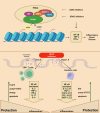Epigenetics of Inflammatory Bowel Diseases
- PMID: 37158530
- PMCID: PMC10334590
- DOI: 10.5152/tjg.2023.22515
Epigenetics of Inflammatory Bowel Diseases
Abstract
Inflammatory bowel diseases are multifactorial, chronic, continuous, relapsing, and immune-mediated diseases of the gastrointestinal tract. It has been believed that mechanisms underlying inflammatory bowel diseases include genetic predisposition, environmental factors, and altered immune response to the gut microbiome. The epigenetic modulation takes place via chromatin modifications, including phosphorylation, acetylation, methylation, sumoylation, and ubiquitination. The methylation levels of colonic tissue were found well correlated to blood samples in inflammatory bowel diseases. Moreover, the methylation level of specific genes was different between Crohn's disease and ulcerative colitis. It has been shown that the enzymes affecting histone modifications like histone deacetylases and histone acetyltransferases do not act solely on histones but also affect the acetylation of many proteins such as p53 and STAT3. It has been already shown that a nonselective histone deacetylase inhibitor, Vorinostat (SAHA), which is currently being used in several cancer treatments, showed anti-inflammatory activities in mouse models. Among epigenetic alterations, long non-coding RNAs and microRNAs play significant roles in T-cell maturation, differentiation, activation, and senility. The long non-coding RNA and microRNA expression profiles can perfectly separate inflammatory bowel disease patients from healthy controls and are remarked as biomarkers of inflammatory bowel diseases. Overall, many studies have shown that epigenetic inhibitors can target significant signal pathways in the pathogenesis of inflammatory bowel diseases, and the impact of epigenetic inhibitors is being studied in clinical trials. In conclusion, exploring more epigenetic pathways regarding inflammatory bowel disease pathogenesis will help us to discover therapeutic targets and new drugs and agents targeting miRNAs in inflammatory bowel diseases. In general, discovering epigenetic targets could improve the diagnosis and treatment of inflammatory bowel diseases.
Conflict of interest statement
Figures




References
MeSH terms
Substances
LinkOut - more resources
Full Text Sources
Research Materials
Miscellaneous
